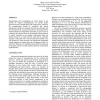Free Online Productivity Tools
i2Speak
i2Symbol
i2OCR
iTex2Img
iWeb2Print
iWeb2Shot
i2Type
iPdf2Split
iPdf2Merge
i2Bopomofo
i2Arabic
i2Style
i2Image
i2PDF
iLatex2Rtf
Sci2ools
100
click to vote
SIGCOMM
1995
ACM
1995
ACM
Authentication Protocols for Personal Communication Systems
Masquerading and eavesdropping are major threats to the security of wireless communications. To provide proper protection for the communication of the wireless link, contents of the communication should be enciphered and mutual authentication should be conducted between the subscriber and the serving network. Several protocols have been proposed by standards bodies and independent researchers in recent years to counteract these threats. However, the strength of these protocols is usually weakened in the roaming environment where the security breach of a visited network could lead to persistent damages to subscribers who visit. The subscriber's identity is not well protected in most protocols, and appropriate mechanisms solving disputes on roaming bills are not supported either. To solve these problems, new authentication protocols are proposed in this paper with new security features that have not been fully explored before.
Related Content
| Added | 26 Aug 2010 |
| Updated | 26 Aug 2010 |
| Type | Conference |
| Year | 1995 |
| Where | SIGCOMM |
| Authors | Hung-Yu Lin, Lein Harn |
Comments (0)

